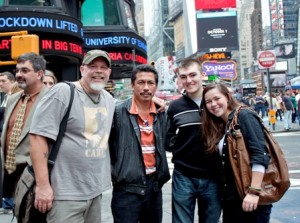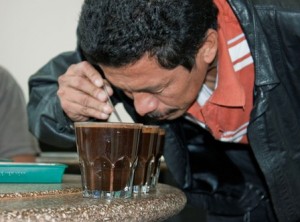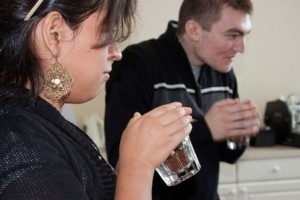
Troy Reynard of The Cosmic Cup Coffee Co. in Easton, Sergío Aguilar, Richard Durham ’11, and Hannah Rhadigan ’11 in New York City.
For the past several years, members of the College’s Economic Empowerment and Global Learning Project (EEGLP) have collaborated with rural villages in the Yoro region of Honduras and the Honduran national coffee board to help the villagers build a 30,000-plant coffee plantation. The first 15,000 plants are now harvested and ready to be sold. Sergio Aguilar, the board’s coordinator for the Cortes and Yoro regions, spent a week in Easton and New York City, interacting with students, speaking on campus, and meeting with prospective coffee importers in New York. A group of EEGLP students and faculty accompanied Aguilar during the trip, including art major Hannah Rhadigan ’11 (Lapeer, Mich.), who documented the experience through photos and the following account.
The members of EEGLP have been working very hard in Honduras over the past four years to help rural communities become the economic drivers of their own lives, and the relationship created with Sergío Aguilar has been a driving force behind our continued success in the country. With coffee farming being the main focus of our project, Sergío’s expertise in agricultural engineering, coupled with his knowledge and connections in the Honduran coffee industry, have been a very important asset in improving the economic future of the small rural village of Lagunitas, Honduras.

Sergío Aguilar evaluates coffee aroma.
Sergío’s visit to Easton was an exciting time for EEGLP and marked an important step in our current work as we begin to bring the project to a close. Though we are closing one project in Honduras, we have been asked by Sergío to again partner with him as he works with new reforestation projects.
I believe one of the largest necessities in a project like this is gaining the trust and respect of the community you are working with. We ask a lot from each community, and in order for our work to be successful the members involved must be fully committed. It is a reciprocal relationship, and the community members have to want to better their lives and put in the work to do it.
Once this relationship is established, keeping it is yet another challenge, and only being able to visit the community a few times each year makes it even more challenging. The relationship we have created with Sergío has helped combat this problem, and he is able to keep us connected and give us updates on the project while we are away. In the beginning of the project, we were the ones contacting people and trying to put together some kind of plan. To now have our work respected and valued enough that people are coming to us is a feeling of success that I do not think I would have ever expected.

With bringing Sergío to campus this fall, we are continuing to build this relationship, as well as give other individuals around campus the opportunity to get involved. When we travel to Honduras, Sergío has always been our main contact and took time out of his schedule to help us in any way he could; it was very nice to now have the opportunity to do the same for him. I most enjoyed sitting back and watching him talk with other people and seeing the passion behind his work. He truly loves his country and is doing all he can to help better its future.
With our work in the communities, one of our long-term goals is to no longer be needed, to have the ability to walk away from a community because they have everything under control. We are beginning to get this feeling in Lagunitas, and this also happened with Sergío. This made his trip even more significant and really drove home to me that the work we have been doing has generated much more. We are no longer just helping one rural community, we are branching out to many other individuals and it is only continuing to grow.
What we do at Lafayette can continue far beyond our few years here and with graduation coming closer each passing day, I am seeing this more and more. Sergío’s visit reinforced the fact that once I am no longer at Lafayette and part of EEGLP, the work will continue and it has the potential to grow into something much larger than I ever expected.


